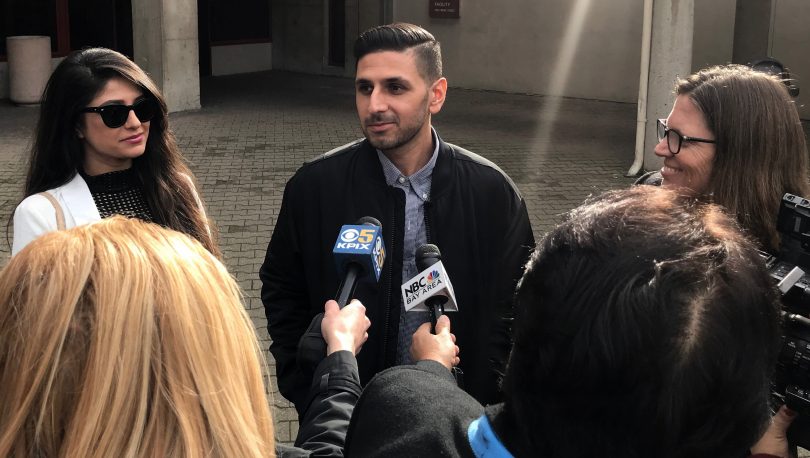On Friday morning, January 18, Judge Laurel Brady re-sentenced 34-year-old Adnan Khan, dropping his original 25-to life sentence for murder to three years for robbery, while vacating his murder conviction.
Since Khan had already served more than five times the required amount of time, the re-sentencing led to his release from prison later that same day after nearly sixteen years inside.
As it happens, Adnan Khan is one of the two authors whose essays WitnessLA has been publishing in a series called Dispatches from San Quentin, which has been made possible by the FirstWatch project at San Quentin State Prison, created in collaboration with a unique program called Re:store Justice.
(You can find Khan’s latest essay called “Sticks and Stones” right here.)
Now, as of last Friday, Khan has become the first person in the State of California to receive re-sentencing and release since the implementation of SB 1437, the law that changed the felony murder rule
“The decision,” said said Kate Chatfield, Policy Director for Re:store Justice, and also Khan’s attorney, “brings a new promising reality of a more just system for the countless men and women who are currently serving life sentences for murders they did not commit.”
Upon his release, Khan moved into Re:store’s Oakland re-entry home, where he will remain while he gets on his feet and plans next steps.
SB 1437, which became California law on January 1, 2019, replaces the felony murder rule, which let prosecutors charge all accomplices to a felony, such as robbery, with murder, if the crime resulted in death, no matter if the person had no part in the killing, and never intended to harm anyone.
In Khan’s case, in 2003, he was 18, homeless, had dropped out of high school, and felt confused about his future, when he agreed to participate in a crime. With two others, plus a last minute recruit as a getaway driver named Rick Page, whom Khan barely knew, Khan agreed to help rob the group’s mutual marijuana dealer, a good-looking 19-year-old with a nice smile, named Kevin Leonard McNutt.
The idea was reportedly to pretend to make a drug deal with McNutt, then grab the drugs and run. But after McNutt insisted on doing the transition in Page’s van, instead of out in the open, the plan began to go south. Suddenly, instead of letting Khan do his grab-and-run, Page got out of the van with McNutt, and began hitting the young dealer. At the time, no one reportedly recognized that the unplanned “punches’ were done with a knife.
Page was stabbing McNutt to death in what was later believed to be some kind of rage induced by a combination of mental illness, and going off his meds.
Khan was arrested at 2 a.m. the next morning. When he learned McNutt had died, he began crying hysterically. Several hours later, he was charged with robbery and murder.
He had been living in Antioch, California, so was taken to the Contra Costa County jail where, a few days later still, he received a stapled copy of the felony murder statute.
“The language was confusing,” Khan would write a decade and a half later. “And I found myself looking up words in each sentence. After decoding it, I realized that because I committed a robbery, I was equally guilty of the murder. Reality settled in.”
After four years in jail, Khan’s trial took place. He was found guilty, sentenced to 25 years to life, and sent to a maximum security Level 4, California prison. Around eight years and another prison later, he finally landed in San Quentin which had much better programs for its inmates. Desperate to do something “positive,” he began taking every class he could find, mentored other inmates, and eventually became the co-founder of Re:store Justice, which would become the main sponsor of SB1437.
He also founded FirstWatch, a video series that tells the stories of life inside San Quentin, and which launched the essay program. Khan is the chairman of SQUIRES, an unusual program that allows local kids to come into the prison.
“We, the incarcerated men, share and listen to life stories and feelings, empowering the youth and deterring them from making similar harmful choices we’ve already made,” Khan said of that program, which is one of his favorites.
And then thee is Re:store Justice, through which Khan and other San Quentin inmates work in partnership with survivors of crime, district attorneys, CDCR officials, and various community members to, as the website puts it, “re-imagine and reform our criminal justice system to be one of true inclusion and justice.”
On Christmas Day 2018, Khan’s work to change his life, and the lives of others, paid off: former Governor Jerry Brown commuted Khan’s sentence from 25-to-life to 15-to-life, years that he had already served, meaning Khan would now be eligible for parole.
But his opportunity for re-sentencing came first.
“I understand that my actions on Monday, March 24, 2003, created lifelong grief for the McNutt family and nothing that I can do will change the results of that callous act,” Khan wrote in his commutation application. “If given the opportunity to re enter society, I will live a life of service with the purpose of preventing and deterring crime and increasing public safety for our communities.”
Easy words to say, of course.
Yet, corrections officers who got to know Khan seemed to agree, according to the former governor’s commutation statement. One corrections officer who wrote Brown, praised Khan for his “dedication” to mentoring young people. “I truly believe Mr. Khan serves us far better in our communities, not in our prisons,” the CO wrote.
A second corrections officer went further.
“I am aware of the crime Mr. Khan has committed,” he wrote. “And I believe it does not serve the State, nor society a purpose to keep him in prison an extra decade. I am writing in strong support of Mr. Khan’s commutation and hope you will consider giving him a second chance that I know he has worked incredibly hard for.”
Even Contra Costa District Attorney Diana Becton was among those who favored Khan’s release.
“Our office recognizes the severity of the crime and the trauma he has inflicted on the family of the victim,” Becton wrote to Brown. “But given the specific facts and circumstances of this case, we believe justice would be served by granting clemency.”
Becton’s office made clear it did not oppose Khan’s re-sentencing motion on Friday.
To the contrary. “As prosecutors, we too must adapt our sense of fundamental fairness to reflect what is right, and what is just,” DA Becton said in a statement released after Khan’s morning hearing.
Kevin McNutt’s mother was reportedly not in favor if Khan’s release. She told ABC7 by phone that she “does not believe in the justice system.”
Yet, on Christmas day when Brown granted clemency to Adnan Khan, Jerry also granted clemency to James King, the other San Quentin author/essayist from Re:store Justice whose work WitnessLA has been publishing,
We’ll tell you more about King’s life and his case soon.
In the meantime, we have just published a different perspective of Khan’s release written by Rebecca Weiker, who is the Program Director for Re:store Justice, whose work is informed by the fact that she also a crime survivor; her sister Wendy was murdered in 1992.
We think you’ll find her story to be important reading.



This guy is a piece of shit. He participated in a felony that ended with a person being killed. Can we put a timer on this guy so when he commits another crime we can all say i told you so. Shame on this state. Third world shit pile.
Great News! I’m sure the new Sheriff feels for this criminal.
He was confused and agreed to commit a robbery but not to hurt anyone? Haha. okie dokie
Why include the new Sheriff? He has nothing to do with this.
He’s a left wing wacko. Enough said.
He’s the new Sheriff voted in by his constituents both Left & Right and no more Wacko than the Foolish Orange Man himself, Donald “Dumb Ass” Trump.
America is crying now.
Max Immelmann:
Citation(s) needed.
Prime example of the failed and out of touch Politicians in CA. Robbery leads to a murder, where’s the justice for the victim. Don’t matter what side your on, if your loved one was killed I’d want all responsible to be held accountable, PERIOD!
Bye, I would take that wager. I say a law enforcement officers will probably sexually assault someone before this guy gets caught for anything, even jaywalking.
Out of Touch, of course if one of our/my loved ones was killed we would want all responsible held accountable. First, we don’t make policy based on what you or I want. If so, I probably couldn’t sit next to some of you at the lunch counter. Second, the devil is in the details. What is “accountable?” I think this guy did his time and then some.
Great news! People should be held accountable for the crime THEY commit. This poor man served all those extra yrs for someone else’s crime.
Completely agree. We shouldn’t be held liable for someone else’s actions. This guy was given a 25 to life sentence, while the actual murderer received 15 to life.
Once again we are getting off track. We got here because, in the past, criminals would get six years for Rape then after two years get released and committed more crimes. Rap sheets ten to fifteen pages long. Can we recall THREE STRIKES? Regardless of the tripe the stats clearly showed reduction in crime as these criminals, weren’t around to commit more crime.
Even if statue has past, because of this new law the victims should sue(civil) for damages. Good that, on the surface, these two have changed but, they are still responsible and got to pay up.
He didn’t spend sixteen times more in prison. The law changed and he got what was prescribed by law. And a special note that Three Strikes passed with support from both sides.
Now, if these two commit another crime(felony or misd) will we get an update. Will hear an apology? BTW: How to the victims feel? Of course they are always discounted and taken way out of context.
If they have changed then good but, there’s always a but!
[…] As we wrote earlier, last Friday, 34-year-old Adnan Khan, who is one of our columnists, became the first person in the State of California to be re-sentenced, then released since the implementation of SB 1437, the law that changed the felony murder rule. Khan and his family are extremely grateful and relieved by his release, of course. But how will the new law that became active on January 1, 2019, affect other Californians, such as victims of crime, or crime survivors who have lost someone they loved. Respected justice reform expert, Rebecca Weiker, is the Program Director for Re:store Justice, and knows Adnan Khan well. But Weiker’s work is also deeply informed by the fact that she is a survivor whose beloved sister was murdered in 1992, which adds a crucial extra dimension as she explores these complex issues. […]